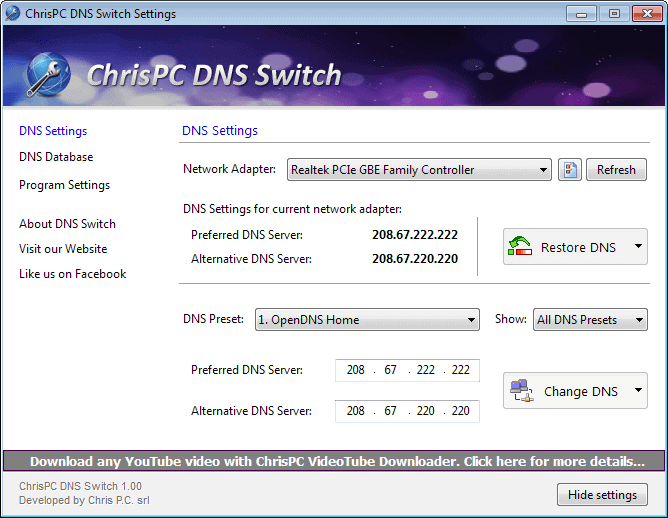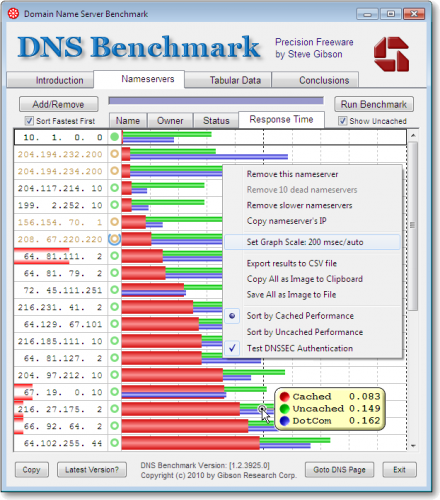

#Google dns benchmark free
The OpenDNS free plan does not require creating an account and it offers almost the same features as that of Google DNS. OpenDNS promises not to share your information with outside parties. The OpenDNS service comes with two different plans: free and premium. The Google Public DNS service only comes as a free plan (where you are the product). The main difference between OpenDNS and Google Public DNS is not in functionality but in the pricing plan of both services. Both are very effective options to replace your ISP’s default DNS server. OpenDNS and Google Public DNS both offer very fast DNS resolution services. Just change your network settings to the following specifications: That said, one of the greatest advantages of Google Public DNS is that it does not require creating an account (because Google already knows more about yourself than you know), as it is free. Furthermore, Google’s public DNS service does not include helping to block certain websites or hosting a domain. However, there’s no way the ISP and location information are deleted, as they are permanently stored. However, the service is arguably better than making use of your ISP’s default DNS server.Īccording to Google, your querying IP address will be deleted after 24–48 hours. Google public DNS is not the best when it comes to privacy. With Google recursive public DNS, you will get an improvement in your browsing speed, valid search results, and great security. Google promises it won’t correlate any usage data with any personal information you have provided to other Google services. Google Public DNS was created by Google to provide a speedy, secure alternate DNS server. Today, the service has grown to become the world’s largest public DNS service, with more than a trillion queries per day. That said, Google public DNS was first introduced in 2009 as part of the Giant tech company’s “ongoing effort to make the web faster”. In case you are interested in replacing your ISP’s default DNS server with a simple and effective public DNS, Google DNS is one of the best options for you. Within the OpenDNS extensive privacy policy, nothing explicitly states, “we don’t sell your DNS logs.” Google DNS Service: Here’s Everything You Need To Know OpenDNS makes no attempt to hide the fact that it collects and saves DNS logs - as a user you are able to access your own logs as a feature of setting up a (paid) account.

Surge Protector VS Line Conditioner VS UPS

OpenDNS Service: Here’s Everything You Need To Know There are privacy, security, and performance benefits and trade-offs to choosing the right public DNS server over your ISP’s default DNS server. However, both log user data and are not as private as Cloudflare and other third-party DNS service providers. So which of the two public DNS servers is better for your situation, and what are the differences between them?īoth OpenDNS and Google DNS are effective in improving your Internet security and browsing speeds. When it comes to choosing a public DNS server, two of the best in terms of performance and security are OpenDNS and Google DNS.

Popular Public DNS Servers: OpenDNS and Google Public DNS Some public DNS servers support encryption. Private DNS servers give you access to connect to services on the internet, without revealing the content of your browsing activities to your hosting provider. The actual terminology for Private DNS is either DNS over TLS (DoT) or DNS over HTTPS (DoH). What is DNS Anyway?Ī Domain Name Server (DNS) is a hierarchical and decentralized naming system that takes alphanumeric domain names, called hostnames, and translates them into numeric IP addresses.ĭNS was created to allow people to connect to services on the internet, and for you to do that, you can either choose to make use of a private DNS, or a public DNS server such as OpenDNS and Google DNS. Well, from a privacy point of view, neither are ideal: check out these options if you care about data security: The Privacy Risk of Using Your ISP’s DNS. Many gamers and internet users override their ISP’s DNS by using Google’s Public DNS servers (8.8.8.8 and 8.8.4.4) or OpenDNS’ servers (206.67.222.222 and 208.67.220.220), both of which are free to use and freely available on the internet.


 0 kommentar(er)
0 kommentar(er)
